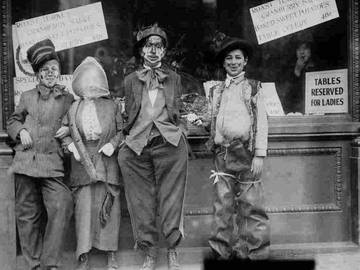What to KnowA ragamuffin is a ragged or beggarly person. For a short time the word was used to refer to children who dressed up as beggars and marched in a parade on Thanksgiving day. The rag part of ragamuffin is likely related to ragged but the muffin part is of uncertain origin.
The word ragamuffin can refer to a ragged person, a type of music (also known as raggamuffin or ragga), and a demon in the 14th-century poem Piers Plowman. But this versatile word has another meaning: beginning in the 19th century, it described participants in the American tradition of "Thanksgiving masking" or "ragamuffin parades."

Participants in a ragamuffin parade around 1910. Beginning at the end of the 19th century, children participated in "Thanksgiving masking" or "ragamuffin parades," in which they dressed in costumes and begged for handouts for their Thanksgiving meals.
Origin of Ragamuffin
First, some history. The origin of the word ragamuffin is somewhat uncertain. In Middle English the word functioned both as a surname and generically to denote a ragged and sometimes stupid person. Its earliest known literary use is in William Langland's Middle English alliterative poem Piers Plowman, in which it appears as the name of a demon.
Ac rys vp ragamoffyn and reche me alle þe barres That Belial þe beel-syre beot with þy damme.
[Translation: So rise up Ragamuffin and break all the bars that Belial your grandfather beats your mother with.]
The muffin part of the word may have its origin in either of two Anglo-Norman words for a devil or scoundrel, but that too is uncertain. As English lexicographer Samuel Johnson put it, "From rag and I know not what else."
No matter its muddied beginning, ragamuffin is firmly established in Modern English as a word for a ragged or beggarly person.
Pigpen could be another favourite. As his name suggests, this grubby ragamuffin is always mud-covered and messy-haired, but is as happy as a pig in ... well, a happy place.
—Catherine O'Dolan, Time Out, 22 Dec. 2015Stewart, who has repeatedly advocated for the 9/11 Victims Compensation Fund, said Paul was "disingenuous" in his stated reasons for delaying a vote on the bill, and called the senator a "scallawag and a ragamuffin."
— Rebecca Morin, USA Today, 24 July 2019
Ragamuffin Parades: A Brief Trend
The use of ragamuffin to describe "a child in masquerade costume" started in the late 19th century, in reference to the children who dressed up on Thanksgiving Day for what was called "Thanksgiving masking." This strange custom began as a parody of begging. Children dressed in costumes, often as ragamuffins, and begged for handouts for their Thanksgiving meals; they often received fruit, pennies, and candy. The practice became so widespread that Thanksgiving was nicknamed "Ragamuffin Day," and cities and towns began holding parades in which children could don their costumes and march. By 1930, the parades and tradition began to wane, as is evidenced by this New York Times headline:
Parading Thanksgiving Ragamuffins Scarce, Except Out Where City's Subway Lines End
By the mid-1900s, the Thanksgiving ragamuffin became a thing of the past. The practice of dressing up and going out to beg, however, lived on in another holiday—Halloween.




